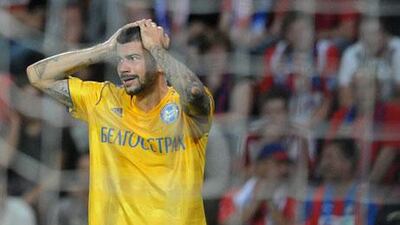Mateja Kezman's arms are amply covered with tattoos: graphic flourishes, symbols, words in different languages and even different alphabets. It is tempting to describe his upper body as like a detailed atlas. His football career reads more like one.
Tonight Kezman makes another home debut, for yet another new club in an European competition.
BATE Borisov, the Belarus champions who take on Barcelona, are the sixth team Kezman has represented in Uefa tournaments.
And that is about the least striking aspect of a catalogue of chopping and changing, of goals and grumps, of highs and lows.
There are not too many 32 year olds who have jumped from playing in an Asian Football Confederation (AFC) competition to the Uefa Champions League in the same calendar year.
The itinerant striker joined BATE in August, a free agent after finishing a stint with South China of Hong Kong. His Asian adventure had followed some of the pattern of previous employments, tinged with controversy. "The AFC Cup is the stupidest tournament I've played in," he told the South China Morning Post last May.
He had several to compare it with. A prodigious young marksman in his native Serbia, Kezman made his Uefa Champions League debut with Partizan Belgrade in his teens. By 21, he had made a sensational impact in Holland with PSV Eindhoven, where he would set Eredivisie records for goalscoring.
There, his performances attracted widespread interest. Chelsea made him one of the first signings of the Jose Mourinho era at Stamford Bridge, but competition for places soon made him less than a guaranteed starter.
"He's a bit raw," one senior Premier League manager observed of him at the time. English football squeezes a player's time and space on the ball, and an uncertain first touch sometimes let him down.
There were some high moments, though. Kezman remembers a particularly good game for Chelsea against Barcelona in the last eight of the Champions League, when he helped set up two goals in a 4-2 win. Chelsea sold Kezman to Atletico Madrid, where he also lasted a season, one spent very much in the shadow of Fernando Torres, then the Atletico star.
He moved on, to help Fenerbahce, where he spent two campaigns, to a Turkish league title and a Champions League quarter-final.
Paris Saint Germain made him a big-brand signing in the summer of 2008 but Paul Le Guen, the French club's head coach, soon preferred other strikers.
London, Madrid, Istanbul, Paris. Where next? PSG loaned him for six months to the Russian side Zenit St Petersburg.
Once back at PSG, his fortunes hardly soared. Kezman left there for good last November, bound for Asia: a new continent, a 12th professional club - Partizan had been his fifth after a quick rise through the lower ranks in the Balkans - in an eighth different country.
By this time, he had also accumulated 49 caps for Serbia - or for "Yugoslavia" as it was when he began, and for "Serbia and Montenegro" - when his international career effectively ended at 27. He had scored 17 goals for his country but may be best remembered for the grumpy episodes. He was sent off at two separate major finals, Euro 2000 and the 2006 World Cup.
His happiest times seem to have been the early days at PSV, where he shared a productive partnership with Arjen Robben - now of Bayern Munich - and had a good relationship with Guus Hiddink, the coach.
His new assignment, in Belarus, inevitably has a temporary feel. Kezman can hardly deny his habit of moving on frequently.
When he joined BATE, he had already programmed his internal navigating equipment to seek out somewhere beyond. "I've signed here until December," he said. "I hope to do well in Europe again, and to be able to join another team for the beginning of next year."


